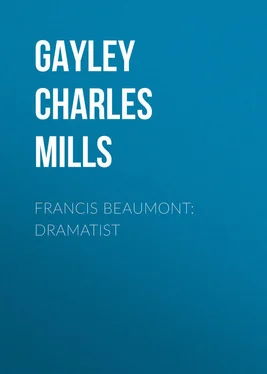Charles Gayley - Francis Beaumont - Dramatist
Здесь есть возможность читать онлайн «Charles Gayley - Francis Beaumont - Dramatist» — ознакомительный отрывок электронной книги совершенно бесплатно, а после прочтения отрывка купить полную версию. В некоторых случаях можно слушать аудио, скачать через торрент в формате fb2 и присутствует краткое содержание. Жанр: cinema_theatre, foreign_antique, foreign_prose, Биографии и Мемуары, на английском языке. Описание произведения, (предисловие) а так же отзывы посетителей доступны на портале библиотеки ЛибКат.
- Название:Francis Beaumont: Dramatist
- Автор:
- Жанр:
- Год:неизвестен
- ISBN:нет данных
- Рейтинг книги:5 / 5. Голосов: 1
-
Избранное:Добавить в избранное
- Отзывы:
-
Ваша оценка:
- 100
- 1
- 2
- 3
- 4
- 5
Francis Beaumont: Dramatist: краткое содержание, описание и аннотация
Предлагаем к чтению аннотацию, описание, краткое содержание или предисловие (зависит от того, что написал сам автор книги «Francis Beaumont: Dramatist»). Если вы не нашли необходимую информацию о книге — напишите в комментариях, мы постараемся отыскать её.
Francis Beaumont: Dramatist — читать онлайн ознакомительный отрывок
Ниже представлен текст книги, разбитый по страницам. Система сохранения места последней прочитанной страницы, позволяет с удобством читать онлайн бесплатно книгу «Francis Beaumont: Dramatist», без необходимости каждый раз заново искать на чём Вы остановились. Поставьте закладку, и сможете в любой момент перейти на страницу, на которой закончили чтение.
Интервал:
Закладка:
CHAPTER IV
THE VAUX COUSINS AND THE GUNPOWDER PLOT
Certain political events of the years 1603 to 1606 must have occasioned the young Beaumonts intimate and poignant concern. Their own family was, of course, Protestant, but it was closely connected by blood and matrimonial alliance with some of the most devoted and conspicuous Catholic families of England. Some of their Hastings kinsmen, sons of Francis, Earl of Huntingdon, were Catholics; and their first cousins, the Vauxes, whose home at Great Harrowden near by had been for over twenty years the harbourage of persecuted priests, were active Jesuits. After the death of his first wife, – Beaumont's aunt Elizabeth, who left four children, Henry, Eleanor, Elizabeth, and Anne, – William, Lord Vaux, had married Mary, the sister of the noble-hearted and self-sacrificing Catholic, Sir Thomas Tresham of Rushton in Northamptonshire; and this lady had brought up her own children, George and Ambrose, as well as the children of the first marriage, in strict adherence to the Roman faith and practice. Henry, the heir to the title, had been one of that zealous band of young Catholic gentlemen who received Fathers Campion and Persons on their arrival in England in 1580. 28 28 John Morris, Life of Father John Gerard , p. 311, et seq.
Before 1594, Henry, "that blessed gentleman and saint," as Father Persons calls him, had died, having resigned his inheritance of the Barony to his brother George some years earlier in order to spend his remaining days in celibacy, study, and prayer. In 1590, George, the elder son by the second marriage, had taken to wife, Elizabeth Roper, also an ardent Catholic, the daughter of the future Lord Teynham. She was left a widow in 1594 with an infant son, Edward, whom she educated to maintain the Catholicity of the family. In 1595, the old Baron, Beaumont's uncle, died – "the infortunatest peer of Parliament for poverty that ever was" by reason of the fines and forfeitures entailed upon him for his religious zeal. Meanwhile, in 1591, we find the daughters of the first marriage, Eleanor, whose husband was an Edward Brookesby, of Arundel House, Leicestershire, and Anne Vaux, concealing in a house in Warwickshire, the well-known Father Gerard and his Superior, Father Garnet, from priest-hunters, or pursuivants. These two cousins of Beaumont are described in Father Gerard's Narrative 29 29 Morris, op. cit. , p. 113. See below, Appendix, Table D.
as illustrious for goodness and holiness, "whom in my own mind I often compare to the two women who received our Lord." The younger, Anne, "was remarkable at all times for her virginal modesty and shamefacedness, but in the cause of God and the defence of His servants, the virgo became virago . She is almost always ill, but we have seen her, when so weakened as to be scarce able to utter three words without pain, on the arrival of the pursuivants become so strong as to spend three or four hours in contest with them. When she has no priest in the house she feels afraid; but the simple presence of a priest so animates her that then she makes sure that no devil has any power over her house." In the years that follow to 1605, the Vauxes are identified as recusants and as sympathizers with the untoward fortunes of Fathers Southwell, Walpole, Garnet, and others. In 1601, their kinsman and Frank Beaumont's, Henry Hastings, nephew to George, fourth Earl of Huntingdon, has joined the ranks and in 1602, we find him in a list of Jesuits "to be sought after" by the Earl of Salisbury, – "John Gerard with Mrs. Vaux and young Mr. Hastings." Father Gerard's headquarters in fact are from 1598 to 1605 with Mrs. Vaux and her son Edward, the young Baron, at Great Harrowden, and there others of the fifteen Jesuit fathers in England at that time, and prominent Catholics, such as Sir Oliver Manners, brother of Roger, Earl of Rutland, Sir Everard Digby, and Francis Tresham, a first cousin of Mrs. Vaux, were wont to foregather.
When James I came to the throne, the Catholics had hope of some alleviation of the penalties under which they laboured. Disappointed in this hope, the discontented, led by two priests, Watson and Clarke, embarked upon a wild scheme to kidnap the King and set as the price of his liberty the extension to Catholics of equal rights, religious, civil, and political, with the Protestants. The plot was betrayed, the priests executed, and the other leaders condemned to death, – then reprieved but attainted. Among those thus reprieved were Lord Grey de Wilton and "a confederate named Brookesby." This Brookesby was Bartholomew, the brother of Eleanor Vaux's husband. When new and more stringent measures were immediately adopted for the repression of priests and recusants, the indignation of the Catholics reached a climax. "They saw," says Gardiner, "no more than the intolerable wrong under which they suffered; and it would be strange if there were not some amongst them who would be driven to meet wrong with violence, and to count even the perpetration of a great crime as a meritorious deed." 30 30 Gardiner, Hist. Engl. 1603-1642, I, 234.
In 1603 Father Gerard took a new house in London in the fields behind St. Clement's Inn, – just across the Strand from the Inner Temple where Francis Beaumont was living at the time. "This new house," says Gerard, "was very suitable and convenient and had private entrances on both sides, and I had contrived in it some most excellent hiding-places; and there I should have long remained, free from all peril or even suspicion, if some friends of mine, while I was absent from London, had not availed themselves of the house rather rashly." 31 31 Morris, p. 360. See also, below, Appendix, Table D.
These friends were Robert Catesby, a cousin of the Vauxes of Harrowden; his cousin, Thomas Winter; Winter's relative, John Wright, and Thomas Percy, a kinsman of Henry, ninth Earl of Northumberland, – all gentlemen of distinguished county families. In May 1604, these men with one Guy Fawkes of York and Scotton, a soldier of fortune and "excellent good natural parts," and, like the rest, fanatic with brooding over the wrongs of the Catholic Church, met at Father Gerard's house behind St. Clement's Inn, swore to keep secret the purpose of their meeting, received in an adjoining room the Sacrament from Father Gerard, an unwitting accomplice, in confirmation of their oath; and then, retiring, learned from Catesby that the project intended was to blow up the Parliament House with gunpowder when the King and the royal family next came to the House of Lords. Within a few days "Thomas Percy hired a howse at Westminster," says Fawkes in his subsequent Confession, "neare adjoyning Parlt. howse, and there wee beganne to make a myne about the XI of December, 1604." The rest of the story is too well-known to call for repetition. How the gunpowder was smuggled into a cellar running under the Parliament House; how, when Parliament was prorogued to November 5th, 1605, the conspirators, running short of money to equip an insurrection, added to their number a few wealthy accomplices, – most significant to our narrative, that old friend of the Vauxes, Sir Edward Digby, and Francis Tresham, cousin of Catesby and the Winters, and as I have said of the Vauxes themselves. 32 32 Fletcher's connections, also, the Bakers, Lennards, and Sackvilles were interested in the fortunes of Francis Tresham; for he had married Anne Tufton of Hothfield, Kent, granddaughter of Mary Baker who was sister of Sir Richard of Sissinghurst and of Cicely, first Countess of Dorset. – Collins, III, 489; Hasted, VII, 518. See below, Appendix, Tables D, E.
How Tresham, recoiling from the destruction of innocent Catholic Lords with the detested Protestants, met Catesby, Winter, and Fawkes at White Webbs, "a house known as Dr. Hewick's house by Enfield Chace," and laboured with them for permission to warn their friends, especially his brothers-in-law, Lord Stourton and Monteagle; and how, when permission was refused, he wrote an anonymous letter to Monteagle, begging him "as you tender your life, to devise some excuse to shift of your attendance at this Parliament; for God and man hath concurred to punish the wickedness of this time." How Monteagle informed the Council and the King. How Guy Fawkes was discovered among his barrels of gunpowder, and on the fourth of November arrested as "John Johnson," the servant of Thomas Percy, one of the King's Gentlemen Pensioners. How "on the morning of the fifth, the news of the great deliverance ran like wildfire along the streets of London," and Catesby and Wright, Percy and the brothers Winter, were in full flight for Lady Catesby's house in Ashby St. Legers, Northamptonshire, not far from Harrowden.
Интервал:
Закладка:
Похожие книги на «Francis Beaumont: Dramatist»
Представляем Вашему вниманию похожие книги на «Francis Beaumont: Dramatist» списком для выбора. Мы отобрали схожую по названию и смыслу литературу в надежде предоставить читателям больше вариантов отыскать новые, интересные, ещё непрочитанные произведения.
Обсуждение, отзывы о книге «Francis Beaumont: Dramatist» и просто собственные мнения читателей. Оставьте ваши комментарии, напишите, что Вы думаете о произведении, его смысле или главных героях. Укажите что конкретно понравилось, а что нет, и почему Вы так считаете.












